Through their respective roles as a private investigator, police chief and personal-protection officer, Anji MaCuk, Jessica Robledo and Niki Jones are forces of nature working toward a stronger, safer Austin.
By Rachel Rascoe, Photos by Keith Trigaci
Strength: It’s a concept often illustrated by bulging muscles or physical feats that takes on new meaning when applied to a lifetime passion for protecting others.
The drive and sense of duty displayed by Anji MaCuk, Jessica Robledo and Niki Jones leave no question about each woman’s end goal: to help serve their community. This power trio of professional protectors keeps the Austin area safe with their stellar work in private investigation, as well as through the police force and personal-safety instruction.
Throughout their conversation with Austin Woman, it became eminently clear: When the going gets tough, these tough ladies get going.
Anji MaCuk
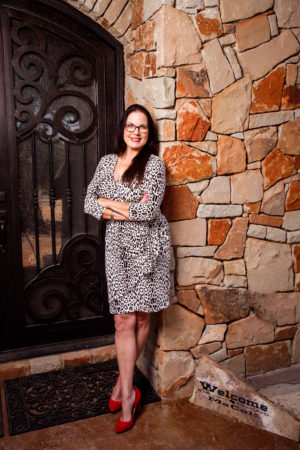 Her protective profession: Owner of She Spies Private Eye and Next Step Youth Transfer Services
Her protective profession: Owner of She Spies Private Eye and Next Step Youth Transfer Services
Anji MaCuk’s wildest days on the job have involved going undercover at a swingers’ club and blurring out video taken during an investigation at a nudist colony. On her most heartwarming days, she finds runaway teens and reunites long-lost loved ones.
She does it all under the umbrella of private investigation. Sparked by early genealogical detective work done at a young age, MaCuk went on to study criminal justice in college, during which time she hesitantly accepted an internship at the Victoria County Juvenile Services Department.There, she discovered her love for acting as a second mother and mentor to at-risk youths in trouble with the law. After graduation, she accepted a job as a juvenile-protection officer and later relocated to her current home base of Georgetown, Texas. At the time, the local paper reported she had double the caseload, compared with the other juvenile-protection officers, and had the highest success rate—a tribute to her superpower capacity for compassion in cases involving children.
While working as a background investigator at the Austin Police Department, MaCuk reignited her childhood love for investigation. She soon jumped into starting her own private-investigation company, She Spies, 14 years ago.
Through her three offices in Dallas, Austin and Round Rock, Texas, attorneys and clients contact MaCuk and her team to help with everything from child-custody cases to locating lost children. Her undercover antics as an investigator have earned her appearances on reality TV and talks with major networks about starting a show of her own.
To get her beloved youth cases out of trouble and into safe environments nationwide, often in the form of treatment or rehabilitation programs, MaCuk founded Next Step Youth Transport Services in 2013. She also personally investigates Texas-area missing-children cases pro bono for the American Association for Lost Children.
Austin Woman: Did you have any childhood experiences that hinted at your current investigative work?
Anji MaCuk: My mom was a stay-at-home mom, so, to stay busy, she started doing genealogy. To be a genealogist, you’re basically a detective because you’re hunting and researching relatives. I was the oldest, so she would take me on trips to the library and interviews with family members. We would go to cemeteries because she was always looking for somebody’s grave. It got to where she would just tell me, “Anji, we’re going to the library and I want you to look for this.” Growing up that way is what made me start to realize how much I enjoyed investigating, and I also loved reading Nancy Drew books.
AW: What unique qualities do you think have led to people preferring you as a private investigator?
AM: Back when I started, there weren’t that many women in the industry, so I got busy fast. I learned as soon as my name started to get out there that people wanted to hire a woman as their P.I. Many people wanted a female helping them to gain custody of their children because we can understand how important it is to make sure your child is safe, and that’s not saying that men don’t. A lot of men also hire me for divorce cases because they were embarrassed to talk to their friends about it. I think women are very good at this because we are compassionate. In this job, you’re on the phone talking to clients who are high-strung, emotional, and we’re having to calm them down.
AW: What tools do you most commonly use while out doing surveillance?
AM: A good set of binoculars, a good camera and covert equipment. … I have a key fob that has a camera in it, but it just looks like a set of keys. I have a coffee mug that has a camera in it too. Because iPhones these days have such great cameras on them, sometimes that’s our best bet. Especially when you’re in a restaurant or someplace, it’s really easy to sit there and get video of someone and it just looks like you’re on your phone.
AW: Throughout the whole investigation process, what is usually the most satisfying stage for you?
AM: It depends on the case. If it’s a child-custody case, it’s knowing the work we did and the evidence we were able to produce helped keep a child safe. That’s my ultimate goal, that these kids end up with the right parent, whoever that may be. When it comes to something like divorce, then it’s providing answers to my client. I’m working with one right now where she’s been married for 35 years. Her whole life has been with her husband, so she’s devastated over the fact that he’s most likely having an affair. My goal is uncovering the truth so they, as a couple, can go and figure out what they need to do. It’s not about breaking up marriages. There’s so many times that something will happen on a case and me and my girls in the office will all look at each other and just go, “Yep, that’s why we do this job.” It’s great when you hear happy endings and good results.
Niki Jones
Her protective profession: personal-protection officer and founder of Sure Shots, a Texas gun club for women
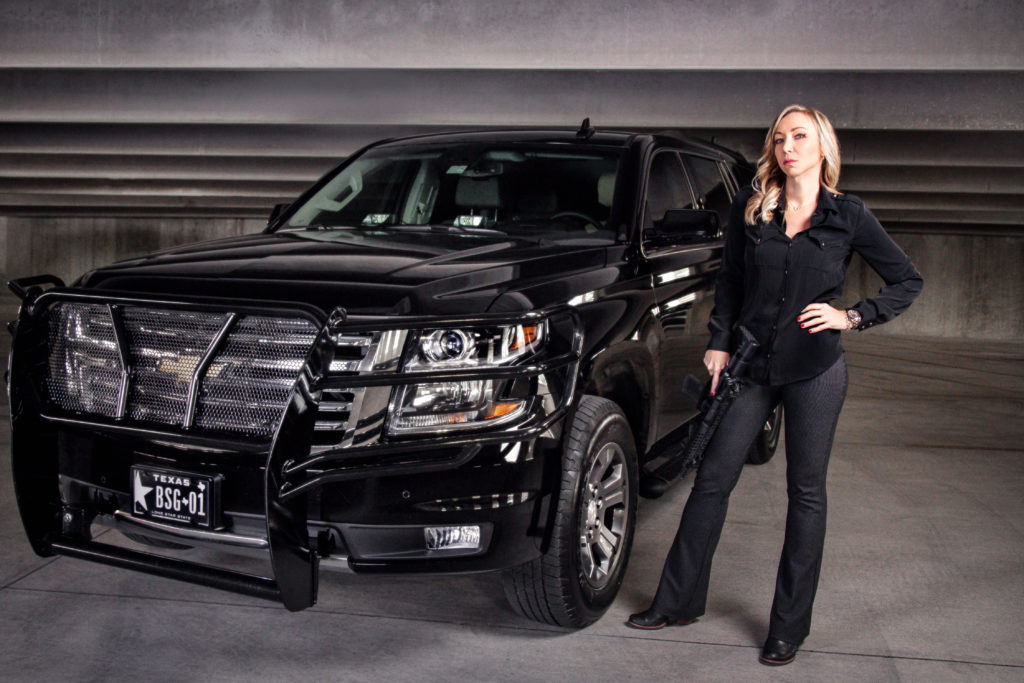
When Niki Jones moved from New York City to Texas, the Southern culture rekindled her interest in firearms, established at a young age by her competitive-shooter parents. After getting her concealed-handgun license, Jones couldn’t find any local gun clubs to suit her tastes.
Seven years later, Jones has appeared on national television programs, including Nightline, promoting self-defense through her female gun club, Sure Shots. The free firearms-savvy social club meets weekly for shooting practice, and has grown to include about 400 members.
Since its start, the group has participated in shooting competitions. Some of the women, including Jones, became certified firearms instructors. During her certification process, Jones learned of a local need for female personal-protection officers.
After completing rigorous training to receive her Level 3 and 4 commissions, she now holds the highest level of security commission achievable in the state of Texas, that of personal protection officer. Through local company BSG Security Services, she provides professional-protection services to clients during festivals and events, including quite a few big-name celebrities.
She frequently provides free seminars about self-protection for groups throughout the city, including speaking to members of the community and college students after recent alarming on-campus attacks.
Through her security work, Jones has also become a licensed private investigator. When she’s not speaking on firearm and personal safety, Jones spends her days working as the creative director at Austin Woman. Shortly after founding the Sure Shots club, Jones combined her passions for guns and design into monthly online publication Sure Shots Magazine.
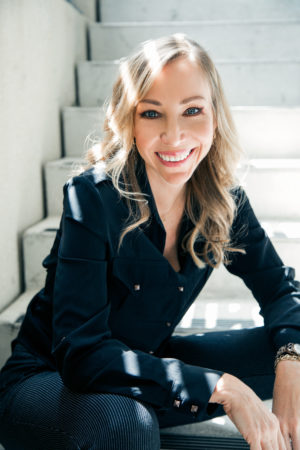 AW: When you started Sure Shots, what did you want the gun club to be like?
AW: When you started Sure Shots, what did you want the gun club to be like?
Niki Jones: I found myself at the range all by myself, and I was thinking about the leagues my parents used to belong to when I was a kid. They didn’t seem to exist here in Austin. I wanted a different kind of gun club, and I wanted it to be free so anyone could just come and try it out. One thing that was really important to me was that it was really inclusive. I saw all these other gun clubs that had very specific political stances. I wanted to welcome every single type of woman, from the super, super liberal to the super, super right-wing and everything in between. That was really important to me because I have friends on all sides of the spectrum.
AW: What are the basic ideas of personal protection you try to instill in groups you speak to?
NJ: Be aware of your surroundings. That is first and foremost. Having your head up and on a swivel has probably saved way more lives than having a gun in your purse. After looking around, distance is insurance. That means if you see a potential threat, put as much distance between you and it. Trusting your gut is the key. Sometimes, as women, we have been taught not to be rude, and that has not helped us. Throw that idea out the window. Walk with confidence. Don’t bury your head in your phone. We do this demonstration in which I’m looking at my phone and my partner will come up right next to me and I can’t see her at all. People walk around like that all the time.
AW: What inspired you to start Sure Shots Magazine?
NJ: A lot of times, people think that women who are into guns are all a very similar type of woman, and we have proven that that is not true at all. You can be a million different things. You can just be a normal, professional, educated woman who happens to be carrying a gun because you care about your protection. I wanted it to look like a fashion magazine and be women’s-defense-oriented, and I wanted there to be something for everyone. If you are some hardcore tactical lady, there’s something in there for you. There’s something in there for someone who’s really into fashion and maybe carries her gun in her Gucci bag. We mix it up.
AW: What’s the most rewarding part of teaching both personal and gun safety?
NJ: I like seeing women of all ages, from all walks of life come in who haven’t necessarily thought about their own personal-defense plan. I get to watch the whole transformation into them now thinking defensively automatically. I equate it to when you first learn to drive. It seems really crazy, and all you’re thinking about is driving. But now, you just get into a car and you’re automatically thinking defensively about the other cars on the road, and that’s just the way you can be with your life. I want to make every woman feel like she can protect herself. We’re teaching women to be aware and be safe and take control of their lives.
Jessica Robledo
Her protective profession: City of Pflugerville police chief
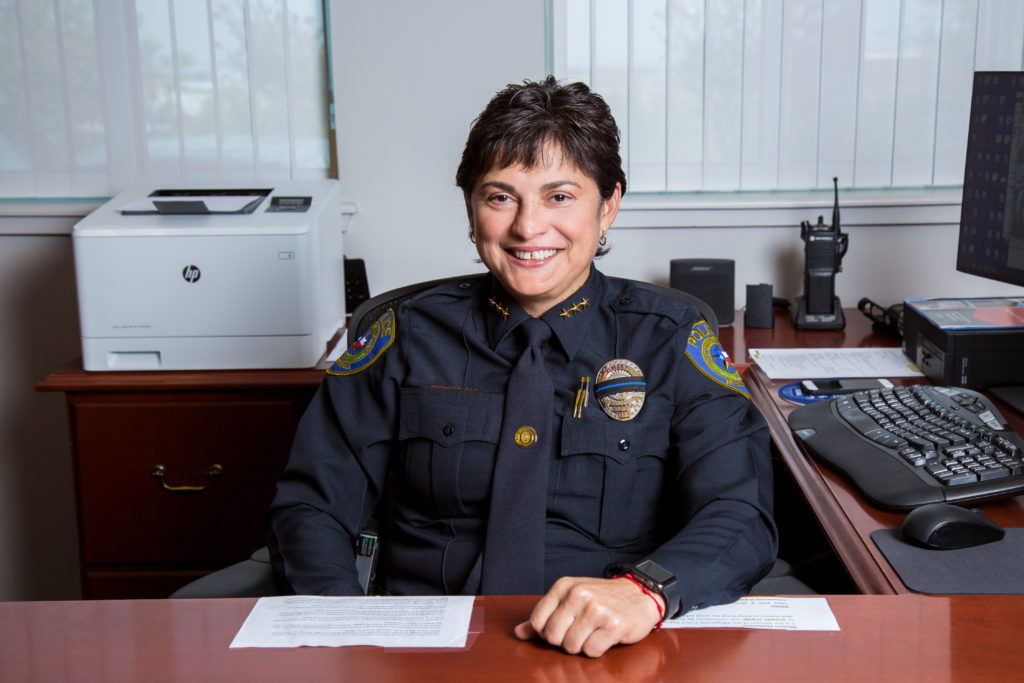
While responding to a disturbance during her early days as a police officer, Jessica Robledo recalls diffusing the situation by sitting down to enjoy a meal with the family. She remembers telling her fellow officer, who stood at attention, “Dude, you need to sit down and have some carne guisada.” This dinner-table encounter captures Robledo’s ethos as a public servant, to engage directly with the community.
Overcoming tragedy that left her orphaned at a young age, Robledo realized her interest in law enforcement while working as a security guard at Sears during college in her small hometown of Sonora, Texas. She went against her grandparents’ concerns and entered into the police academy.
At the Austin Police Department, Robledo became the first female sergeant to supervise the homicide unit, and later became the department’s first Hispanic female assistant chief. During her 28 years with the department, Robledo worked to bring more women onto the force through recruitment events and mentorship of upcoming officers.
Earlier this year, Robledo took her insurmountable energy for community building to the growing city of Pflugerville, Texas, where she leads as the chief of police. After being compared to Pop Rocks candy by the Pflugerville mayor for “the way she pops into action,” Robledo has already overhauled the police gym and increased public engagement through events and social media.
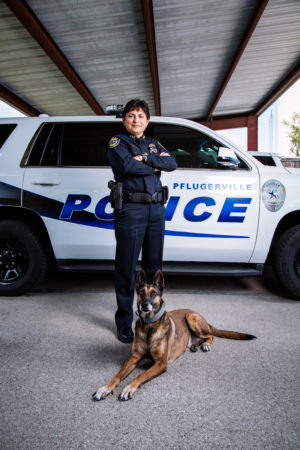 AW: Who’s your biggest role model?
AW: Who’s your biggest role model?
Jessica Robledo: I was raised by my grandparents, and one of the things that my grandfather taught me was don’t forget where you come from. My grandfather had a second-grade education, but I always say he had a Ph.D. in life. I’ll take that any day over a book. He taught me how to build a solid foundation in life, and he taught me about helping people. I would always wonder why we were feeding people that would walk through our town and why he would give them a place to live. I didn’t understand until I was older because now, I do the same, and I’m able to do it in a larger capacity.
AW: What is one of the biggest challenges you’ve faced in your career?
JR: When I entered the [San Angelo Police Academy], there were 13 of us in the academy, and I was the only female, so I had to make the coffee and I had to paint some rocks. That’s kind of telling you they’re trying to weed you out. I did well and I graduated, but then it was time to take the licensing exam. I get test anxiety and I ended up failing the exam. We had a very old-fashioned sheriff. He came in and said, “I told you women aren’t supposed to be in law enforcement,” and humiliated me. He walked me to his office, wrote me a check and said, “Here, get out of my police department.” I was devastated. On my drive home, one of my instructors called me. He said, “Write this number down, pack a bag and drive to Austin.” I went in and retook the test and passed it with flying colors. They told me Austin was hiring, and that’s how it all happened.
AW: What is the legacy you are most proud of from your time at the Austin Police Department?
JR: One of the things that I have a passion for is helping youth. I could have very easily ended up in a foster home because of my circumstances. When you’ve walked a certain path in life, you need to learn to embrace your broken [characteristics]. Everybody’s got broken [characteristics]. Some people refuse to admit it, but I think the more broken [characteristics]you have, the more unique you are. I started thinking about it. How did a child get into that foster home? The badge took their parent away. The badge took that child away from their home for whatever reason. The badge can help heal. So, I started the very first police mentorship in Austin. It’s called Blue Guardian with Austin’s oldest foster home, Helping Hand Home. It’s still going on.
AW: Describe the qualities you want to curate on your police force in Pflugerville, Texas.
JR: I want to embrace our diverse community in partnership because you want to become one with the people you serve. Public trust can be broken like that. It only takes one officer and it taints the entire profession nationwide. None of my officers are going to be abusing people. I tell my officers, “Plant seeds of goodness. Be a good human being.” It all starts there. And then put your badge on and go to work.


